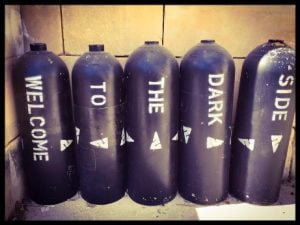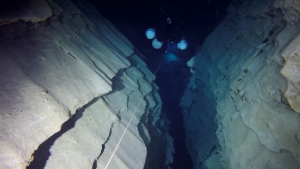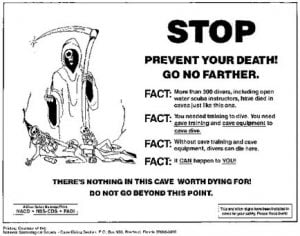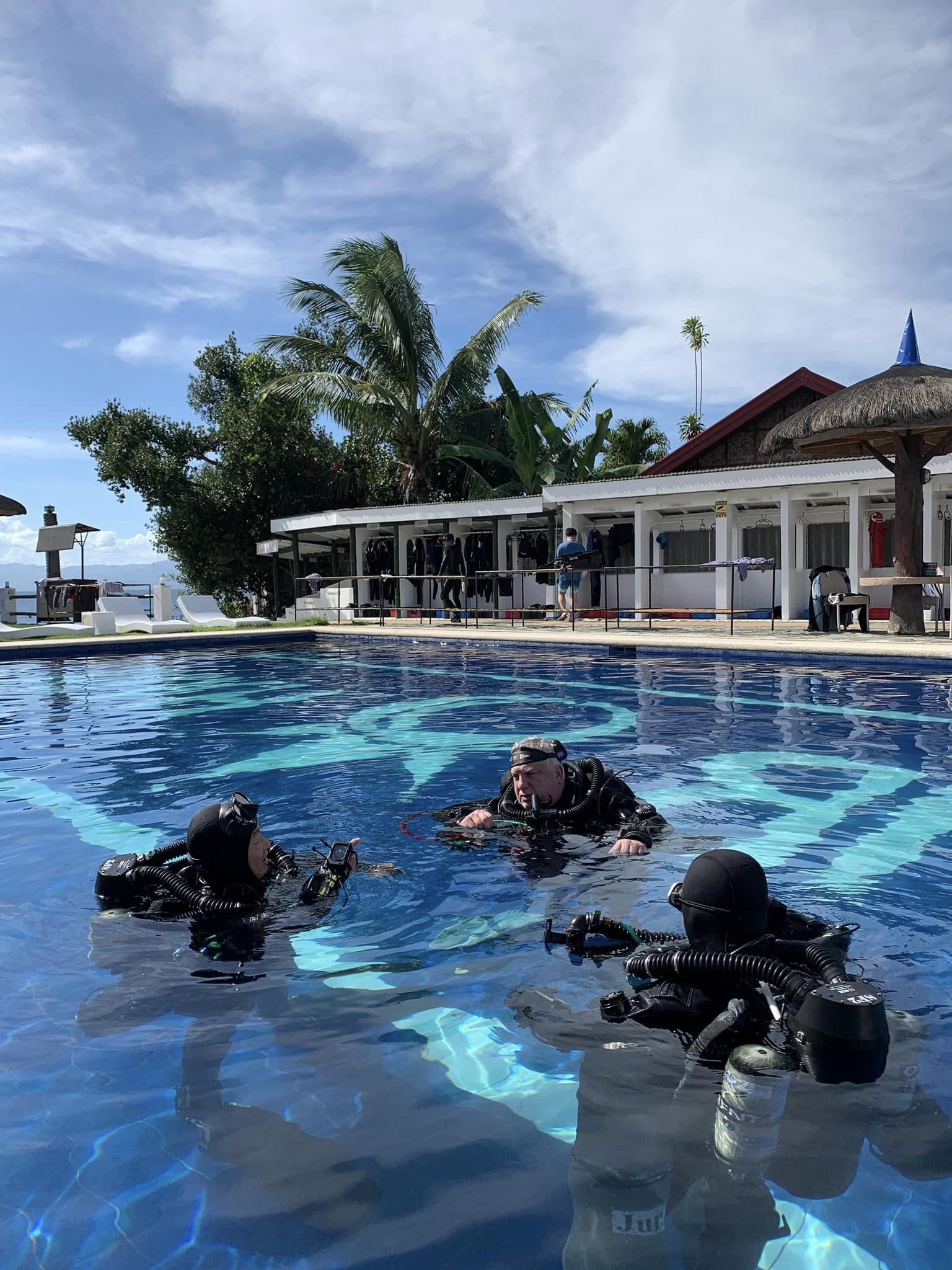Thinking about Technical Diving or wonder ing what technical diving techniques might offer your club diving?
ing what technical diving techniques might offer your club diving?
I started technical diving purely to stay longer under water, with absolutely no intentions of going deeper, certainly no intention of going into caves or deep wreck penetration and believing rebreathers were the gateway to certain death. I may have changed my opinion somewhat since then! But is it for you and does tech diving offer anything to the club diver?
There are many definitions of tech diving…. anything involving one or more of deeper than 40m, overhead, planned decompression, multiple gases, multiple cylinders (twinset /sidemounts) and CCR. To my mind though, rather than base tech diving on some arbitrary equipment set-up or depth limits, technical diving is about an attitude of mind. It’s a philosophy and approach to diving  that changes the way the diver approaches every dive from idea, to plan, to execution to debrief. It’s a technically minded approach that may involve gear selection choices, gas choices but always focussed on safely achieving the dive.
that changes the way the diver approaches every dive from idea, to plan, to execution to debrief. It’s a technically minded approach that may involve gear selection choices, gas choices but always focussed on safely achieving the dive.
As a recreational instructor I once had a student who was excellent in the water and aced all the theory, but, I did not like the attitude – tough on me, as long as he met the performance requirements I had to pass him. In technical this is not the case, I can fail someone on attitude alone, even if they are the most skilled diver ever seen. The acid test is would I let them dive with my loved ones. It is for these reasons that I believe attitude defines whether or not you are a technical diver, whether you dive single tank to 20m or CCR to 100m plus in a cave.
The further I progressed through my technical training, the more conservative I became diving on shorter, shallower fun dives. These days I rarely go past 30m on a single tank set-up and start using Helitrox at 35m for a guaranteed clear head. I now love my CCR for deep and cave because it gives me time, almost 6 hours of gas and at least 3 hours of scrubber duration. In the event of any incident I have time, a divers most precious resource, unconstrained by the volume of my open circuit tanks to fix any issue.
I started diving as a bit of an air hog, but my tech training taught me good trim and advanced buoyancy and propulsion. Frog kick, back fin (great fo r photographers) and more that meant I became much more efficient in the water, halving my gas consumption, didn’t spoil the view for those behind me and reserved any energy I might need for managing any issues. Good trim also allows for easier blood circulation making the off gassing of nitrogen and any other exotic mixtures much more efficient.
r photographers) and more that meant I became much more efficient in the water, halving my gas consumption, didn’t spoil the view for those behind me and reserved any energy I might need for managing any issues. Good trim also allows for easier blood circulation making the off gassing of nitrogen and any other exotic mixtures much more efficient.
I also got taught that 100 bar and 50 bar were important on every dive, now I know exactly what gas I need to have at each point of the dive and the minimum gas reserve needed as well as the time and pressure points where I should turn the dive. It’s funny but rarely are these numbers 100 or 50!
I got taught about no decompression limits and tables and thought if I went into deco the world would end. Now I know every dive is a deco dive, whatever the depth it’s just that some require more stops than others – every dive gets at least one deco / safety stop!
So – is tech for you
If your ambition is to go deeper just to be deep, then no, tech is not for you. Numbers on a depth gauge prove nothing. If however you want to dive the Empire Heritage off Malin Head in 65m or explore deep into the caves of Cong or Mexico then you have a reason for the depth / training and tech is definitely for you.
If you have a relaxed approach to dive planning and are happy that with 10 years plus diving it will all be grand, then n o, tech is not for you. If you know that every dive has risks and that you get satisfaction from properly managing those risks so you can enjoy the dive, then yes, you have the basis of a good tech attitude.
o, tech is not for you. If you know that every dive has risks and that you get satisfaction from properly managing those risks so you can enjoy the dive, then yes, you have the basis of a good tech attitude.
You do not need to be some superhuman either, two of the best tech divers I know are women under 5ft 2” and under 8 stone. They manage sidemounts, CCR’s and multiple stages better than most.
So how to start…
Most agencies offer a discover tech day. While this is usually based on trying out a technical kit set-up, it’s a fantastic chance to spend a day with an experienced technical diver / instructor and find out why they tech dive and the opportunities that exist. Talk to them about Open v Closed Circuit diving and which pathway might suit your needs best. Make sure you have time for a coffee after the day so you can pick their brains.
Talk to other tech divers, ask them what their approach is, why and how they do the dives they do, what got them started and what pathway they took to where they are now. You can cash in on some hard won experience. Use club contacts, join the restarted tech dive forum at http://forum.technicaldiving.ie, call down for a coffee and chat to a tech diving centre.
Pick the right instructor, a thorny subject but we have some tips here https://swt.ie/how-to-choose-your-technical-diving-instructor/. Make sure the instructor will suit you, a good plan is book a coaching day with them, you can save a lot of pain and heartache that way.
If you are already on a tech pathway, think about using different instructors based on their experience and approach. I took a lot of my courses with different people as I wanted to share in a broad range of experience. I have been trained by Mark Powell, Paul Toomer, Phil Sho rt, Tom Steiner and many others and sharing in their experiences have stood me in good stead.
rt, Tom Steiner and many others and sharing in their experiences have stood me in good stead.
On a personal note, I don’t get recreational rebreathers. Regardless of the build and design quality I don’t like a piece of technology that takes the control and therefore the responsibility for monitoring and managing away from the diver. Diving CCR is not as difficult or complicated as some people would have you believe and the confidence a diver has from being fully in control of their own destiny is core to a great diving attitude – technical as well as recreational. Plenty of CCR try dives around for you to find out for yourself.
If you are still interested at this point and if you haven’t fallen out with me over my points above, then you are probably a good candidate for tech. Talk to someone – my door is always open and the coffee is on – bring biscuits!
Matt Jevon, M.Sc. is a Full Open and Closed Circuit Trimix  and Cave Diver. He is also a Technical and mixed gas CCR instructor with TDI. He is the JJ-CCR instructor and dealer for Ireland. He held accreditations as an interdisciplinary sports scientist, sports psychologist with BASES and was a British Olympic Registered Strength and Conditioning Coach. Matt works in high performance business as a board advisor and non-exec, in high performance sport as advisor and coach and is a partner in South West Technical Diving in Ireland. www.swt.ie www.mattjevon.com
and Cave Diver. He is also a Technical and mixed gas CCR instructor with TDI. He is the JJ-CCR instructor and dealer for Ireland. He held accreditations as an interdisciplinary sports scientist, sports psychologist with BASES and was a British Olympic Registered Strength and Conditioning Coach. Matt works in high performance business as a board advisor and non-exec, in high performance sport as advisor and coach and is a partner in South West Technical Diving in Ireland. www.swt.ie www.mattjevon.com




